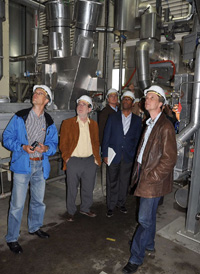Experts assume that most of the worldwide energy consump-tion in the medium term also will have to be covered by chemi-cal fuels. This means: Use of fuels of low calorific value, such as biomass, waste, or oil sand, will increase due to limited re-sources. Research is aimed at converting these low-quality fuels into usable energy at high efficiency in a climate-friendly manner. Experts of the International Energy Agency recently met at the KIT to discuss the production of high-quality fuel from biomass.
The Bioenergy Task 33 Section of the International En-ergy Agency (IEA) focuses on thermal gasification of biomass by high-temperature processes. The high-quality gases produced can be used for either the generation of electricity and heat at a power plant or the production of high-quality fuels and basic chemical materials. It is the objective of IEA’s Bioenergy Task 33 to overcome tech-nical obstacles in this field of research, to accelerate the use of new technologies on the market, and to intensify information exchange between industry and research in the member states. At their meeting from May 13 to 15 on the northern campus of the KIT, 20 participants from ten member states discussed various technical proc-esses in this field and reported about the political and economic boundary conditions in their countries. As a result of the discussion, tasks were defined and main activities were specified for the coming three years. The program also included a visit of research facilities relating to the use of fossil and biogenic fuels for energy produc-tion on the northern campus (Energy Lab).
Another 20 experts from science and industry met at a workshop on the production of synthesis gas from bio-mass. This workshop is concluded today by an excursion to the research laboratories of the industry partner Lurgi GmbH at Frankfurt.
“The challenge in the production of synthesis gas lies in the fact that high-temperature processes have to be de-signed in an energy-efficient, low-pollutant, and climate-compatible manner – in spite of the low quality and sometimes high pollutant fraction of the feedstocks”, un-derlines the host, Professor Thomas Kolb, from the KIT Institute for Technical Chemistry.
Fuel and basic chemical materials may be produced from biomass-based synthesis gases by the bioliq® process developed by Forschungszentrum Karlsruhe. “We can offer a rather promising concept, since the combination of decentralized preliminary biomass treatment with central-ized gas production and synthesis is tailored to the re-gionally distributed arisings of biomass. Hence, economi-cally efficient plant sizes can be reached”, says Kolb.
By means of the multi-stage bioliq® process, fully syn-thetic diesel or Otto fuel can be produced from straw and other agricultural and forestal feedstocks. The quality of this diesel or Otto fuel exceeds that of other biofuels and even that of mineral oil products. In a first step, biomass is converted into a pumpable fuel by decentralized flash pyrolysis. In the following gasification stage, the interme-diate product is converted into synthesis gas. The proc-ess is presently being implemented on the pilot scale (capacity: 1 ton per hour) on the site of Forschungszen-trum Karlsruhe.
As an alternative, the burning gas produced by biomass gasification may be used in a combined power plant with a gas turbine. High energy efficiencies are achieved. “Apart from the high efficiencies, gasification technology also allows for an efficient separation of carbon dioxide (CO2) from the power plant process”, underlines Kolb. The three days’ meeting of the IEA section also focused on how this can be accomplished technically and in an economically efficient manner.
The International Energy Agency (IEA) was founded in 1973 by 16 industrialized nations during the first oil crisis. It is a cross-national organization for advising politics in the field of energy and presently has 28 member states. Its fields of work are climate policy, the reform of the en-ergy market, and cooperation in the field of energy tech-nology, in particular with countries being the main pro-ducers of fuels or having strongly growing energy needs, such as China, India, Russia, and the OPEC states.
The Karlsruhe Institute of Technology (KIT) is one of Europe’s leading energy research establishments: The KIT Energy Center pools fundamental research with applied research into all relevant energy sources for industry, households, services, and mo-bility. Holistic assessment of the energy cycle also covers conversion processes and energy efficiency. The KIT Energy Center links competences in engi-neering and science with know-how in economics, the humanities and social science as well as law. The activities of the KIT Energy Center are organized in seven topics: Energy conversion, renewable ener-gies, energy storage and distribution, efficient en-ergy use, fusion technology, nuclear power and safety, and energy systems analysis.
The Karlsruhe Institute of Technology (KIT) is the merger of the Forschungszentrum Karlsruhe, mem-ber of the Helmholtz Association, and the Universität Karlsruhe. This merger will give rise to an institution of internationally excellent research and teaching in natural and engineering sciences. In total, the KIT has 8000 employees and an annual budget of 700 million Euros. The KIT focuses on the knowledge tri-angle of research – teaching – innovation. It sets new standards in the promotion of young scientists and attracts top scientists from all over the world. KIT is an important innovation partner of industry.
Press Release 049/2009
Clean Energy from Biomass
Section of the International Energy Agency Meets at the KIT – Focus Is on the Environmentally Compatible and Efficient Production of Synthesis Gas

The Bioenergy Task 33 Section of the International Energy Agency at the KIT Energy Lab.
(Photo by: ITC-TAB)
(Photo by: ITC-TAB)
lg, Mai 15, 2009
Contact:
Christian Könemann
Chief Press Officer
Phone: +49 721 608-41190
Fax: +49 721 608-43658
christian koenemann ∂does-not-exist.kit edu
Contact for this press release:
Monika Landgraf
Pressestelle
Tel.: +49 721 608-8126
Fax: +49 721 608-3658
E-Mail
Pressestelle
Tel.: +49 721 608-8126
Fax: +49 721 608-3658
The photo in the best quality available to us may be requested by
presse ∂does-not-exist.kit edu or phone: +49 721 608-41105.
presse ∂does-not-exist.kit edu or phone: +49 721 608-41105.
